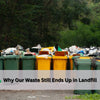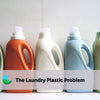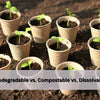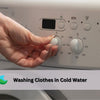10 Impactful Ways to Reduce Plastic Waste: Your Action Guide to Combat Pollution
- by Brodie Cook

Hey there! Worried about plastic pollution in our oceans? You're not alone. Every year, millions of tons of plastic waste end up in the sea. It's like a huge garbage soup out there! Want to know something wild? Most of this marine plastic pollution doesn't even start in the water.
According to National Geographic, 80 percent of ocean plastic actually comes from land. It gets swept into waterways or washes off beaches as litter. But don't worry, we can all play a role in reducing plastic waste. In this guide, we'll show you 10 easy ways to cut down on single-use plastics. These small changes can make a big impact on our planet. Let's work together to keep our world's oceans clean and protect marine life from plastic debris.
1. Embrace Reusable Alternatives to Single-Use Plastic

Let's start small but think big! Swap out those disposable items for reusable alternatives. It's easy! Grab a reusable bottle instead of buying single-use plastic ones. Bring your own bags when you go shopping. And how about a sustainable coffee cup for your daily brew? These small changes add up fast. Just by using reusable water bottles, we could prevent 20 billion plastic bottles from becoming waste each year. That's a significant reduction in plastic pollution! Plus, you'll save money in the long run.
2. Skip Disposable Cutlery and Straws When Dining

When eating out or getting takeout, watch out for sneaky single-use plastics. Say no to plastic straws in your drinks - try going strawless or bring your own reusable one. Getting food to go? Ask if you can use your own containers instead of their disposable plastic ones. Many businesses are happy to do this now. If you're having a picnic or lunch at work, pack a set of real utensils instead of grabbing plastic cutlery. These choices can significantly reduce your plastic footprint.
3. Rethink Your Shopping Habits: Choose Products with Eco-Friendly Packaging
Time to shop smarter! At the store, look for items with less packaging waste. Choose products made from recyclable materials like glass or paper instead of plastic wraps. Buying in bulk is a great way to reduce packaging overall. Don't need something brand new? Try secondhand shops or online marketplaces. You might find great alternatives that are just as good as new but without extra (plastic) waste. These small changes in how you shop can make a big impact on reducing global plastic pollution.
4. Be Mindful of Hidden Plastics: Avoid Microbeads and Synthetic Fabrics

Plastic hides in sneaky places! Did you know that tiny plastic particles called microbeads are in many cosmetic products? According to Plastic Soup Foundation, 87% of tested cosmetics had these microplastics. Yikes! When you wash them off, they end up in our waterways. So, look for face scrubs and toothpaste without microbeads. Instead, choose products with natural exfoliants.
But it's not just beauty products. Liquid laundry detergents and dishwashing soaps can be bad too. Many contain plastic particles or come in plastic bottles that aren't always recycled. Try switching to detergent sheets in cardboard boxes or look for eco-friendly brands that use less plastic.
Your clothes can shed plastic too! Synthetic fabrics release microfibers when washed. These tiny plastic bits slip through water treatment plants and end up in our oceans. Try picking clothes made from natural materials like cotton or wool. They're comfy and better for marine life.
5. Cook More, Reduce Plastic Waste
Ready to make a difference in your kitchen? Cooking at home is a tasty way to cut down on plastic waste. When you make your own meals, you avoid all those takeout containers and plastic bags. It's healthier for you and helps reduce pollution! Got leftovers? Pack them in reusable containers for lunch the next day. You'll save money and reduce waste at the same time. Can't avoid takeout? Try asking if you can bring your own container. Many places welcome this sustainable practice now.
6. Recycle Properly: Understand Your Local Recycling Rate
Recycling helps, but it's not a complete solution. Plastic recycling rate was only 12% in 2020. That's pretty low! But we can do better. First, check what your local area recycles. Not all plastics can be recycled everywhere. Look for numbers on plastic items - these tell you what kind of plastic it is. Most places take bottles marked 1 or 2. Rinse your items before recycling them to prevent contamination. Remember, recycling is just one part of reducing plastic waste. It's great to recycle, but it's even better to use less plastic in the first place.
7. Participate in Beach and River Clean-up Efforts

Want to make a big impact? Join a clean-up! Many initiatives organize beach and river clean-ups. It's a fun way to actively reduce plastic pollution and meet like-minded people. You'll be amazed at how much plastic debris you can pick up in just a few hours. Don't live near water? No problem! Parks and streets need cleaning too. Can't find a clean-up near you? Start your own! Gather some friends and pick a spot that needs some love. You'll see the difference right away.
8. Support Businesses That Prioritize Sustainability
Make a big impact by choosing to shop from brands that care about the planet. Look for companies that use eco-friendly packaging and offer products made from sustainable materials. Many businesses are now committed to reducing their environmental footprint, so your money can support positive change. Choices like buying clothes made from organic fibres or picking up groceries with minimal plastic wrapping, these choices add up.
9. Educate Yourself and Others on Plastic Pollution
Knowledge is power! Learn more about plastic pollution. Read articles, watch videos, or join online groups. The more you know, the more you can help. Share what you learn with others. Tell your friends and family about the plastic problem. Show them easy ways to use less plastic. Maybe they'll join you in making changes! Look for groups that teach about the environment. They often have fun events or classes. You could even volunteer to help teach others. When more people know about plastic pollution, more people will want to fix it. Your voice can make a big difference. So keep learning and keep sharing!
10. Reduce Your Overall Environmental Footprint
Plastic isn't the only problem our planet faces. Climate change makes plastic pollution worse. How? It speeds up the breakdown of plastic in water. This creates more tiny plastic bits that harm animals. So, fighting climate change also helps with plastic pollution. Here's what you can do: Use less energy at home. Turn off lights when you leave a room. Take shorter showers. Try walking, biking, or using buses instead of cars when you can. These steps cut down on pollution and save you money too. Every eco-friendly choice you make helps the planet in many ways. It's all connected! By living greener, you're helping to solve both the plastic problem and climate change.
Conclusion
We're all in this together! Fighting plastic pollution isn't a one-person job. It takes all of us doing our part. But don't worry, you don't have to change everything at once. Start small. Maybe bring your own bag to the store or use a reusable water bottle.
These little steps add up fast. Think about it: if everyone made just one small change, we'd see a huge difference. Less plastic in our oceans, cleaner beaches, and happier animals. Every time you skip a plastic straw or reuse a container, you're helping. So let's team up and tackle this problem together.

 Dishwashing
Dishwashing Laundry
Laundry Bundles
Bundles Toilet
Toilet



